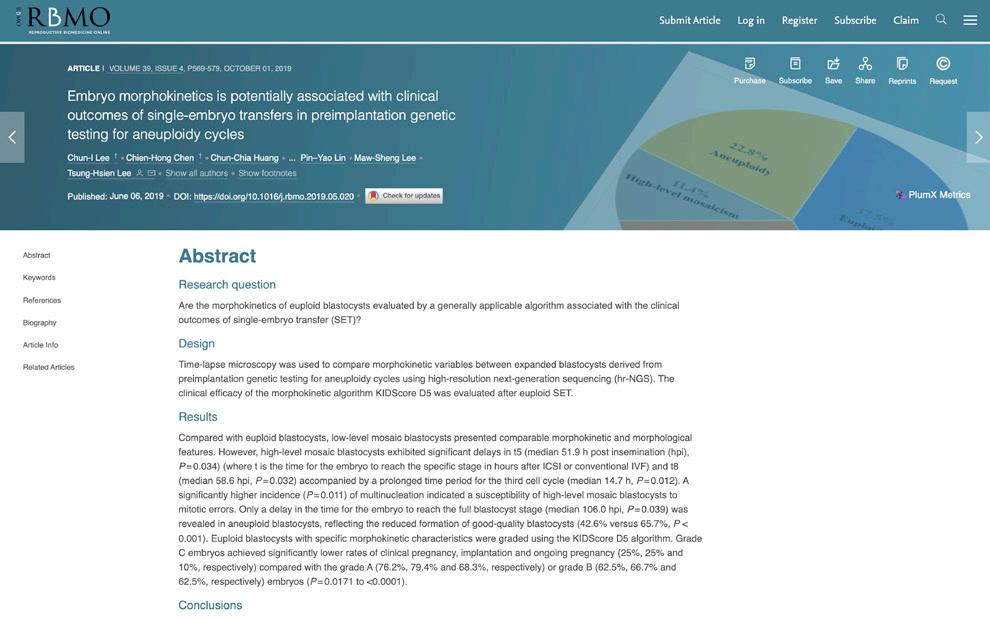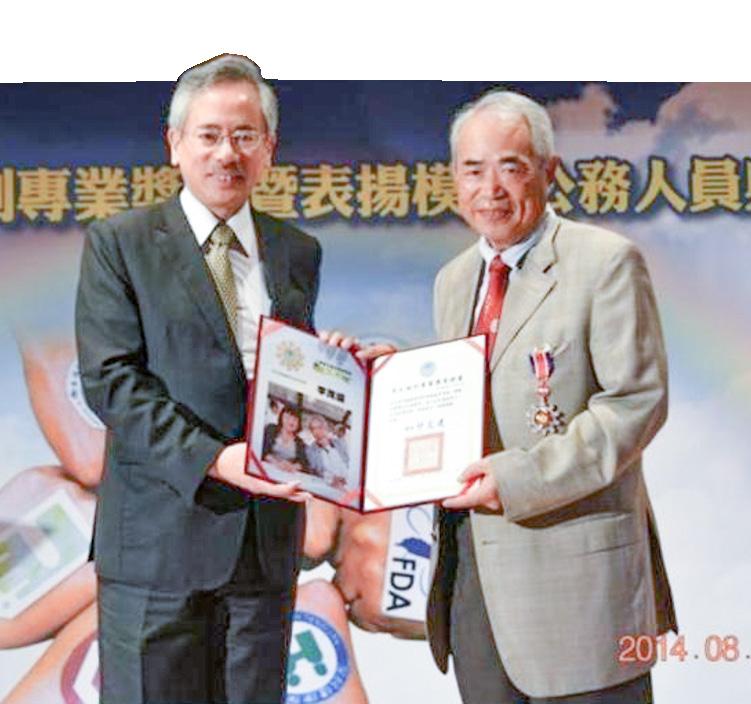
6 minute read
Generation IVF : Embryoscope Time-Lapse System
Embryo's Mansion
Lee Women's Hospital has more than five embryo incubators. Different from traditional incubators, the Timelapse embryo incubator is equipped with 24-hour high-resolution monitoring, allowing it to determine embryo development status quickly and accurately. It can provide more objective and accurate information when screening high-quality embryos suitable for implantation.
Advertisement
Advantages of the Time-Lapse
System
High Resolution Photography and Microscopy
Environment
Monitoring
None
The door needs to be opened during observation
Temps, humidity, and pH will be affected during observation
1~2 times a day, only the static growth of the embryo can be observed.
Important developments
Observing 1~2 times a day, not all can be seen.
Yes
The door doesn’t need to be opened during observation
Temps, humidity, and pH remain stable
Shooting once every 10 minutes, continuous observation for 24 hours, the dynamic growth of embryos can be observed.
Observing 144 times a day, all can be seen and recorded.
Fourth generation IVF: AI Embryo Selection System


In the past 40 years, Lee Women's Hospital has accumulated more than 30,000 IVF babies across 36 countries. With an embryonic pattern database and professional AI embryo selection technology, we can increase the success rate of IVF!
Our research published on ESHRE has won Best Paper Award from Taiwanese Society for Reproductive Medicine!
Effectively increase the chances of pregnancy
Spindle View Positioning Technology
The spindle apparatus is the heart of the ovum. Normally, the spindle apparatus will not be dislocated, but it tends to be displaced more frequently in elderly women or patients with premature ovarian failure, so the spindle apparatus may be damaged during sperm injection. The spindle view positioning technology is used to accurately determine the position of the spindle apparatus and avoid damage to ovum during sperm microinjection. According to clinical statistics, when this technique is applied to elderly women or patients with premature ovarian failure, the insemination rate increases to over 85%!
The Witness System is like the facial recognition system of sperm and ovum.

When a container is replaced, the data is automatically imported into the new container to reduce manual proofreading errors.
After the medical records of IVF patients are archived, the data of both husband and wife will be automatically imported into the Witness System.

During oocyte retrieval and implantation, the patient's identity will be confirmed by her chip bracelet.
During the IVF treatment process, all relevant containers are affixed with exclusive identification chips.
Providing a sense of security for exhausting IVF couples.
If an unpaired sample is placed in the working area, an alarm will be triggered immediately.
Know more about Witness system
With the change of environment and the increasingly serious pollution of environmental hormones, people's demand for reproductive medicine is getting higher and higher. Countries around the world continue to innovate and develop reproductive technology, and Taiwan's IVF technology has reached the No. 1 position in Asia and No. 2 in the world. This is based on the efforts that Taiwan's medical research team has invested in this field 40 years ago.

Professor Maw-Sheng Lee has been devoted to the research of reproductive medicine since 1980, and he has led the laboratory and physician team to continuously study and cooperate with European, American and Japanese teams to develop new cutting-edge reproductive technologies. Since the birth of the first IVF baby in 1987, Professor Lee's team has broken many records with leading technology, of which 5 cases were the first of its kind in Asia, establishing the team's position in the field of reproductive medicine.

With two world records and contributing a number of reproductive technologies to Taiwan, Dean Maw-Sheng Lee was awarded the National "2nd Class Professional Medal" by the Ministry of Health and Welfare in 2014. At that time, very few physicians could receive this honor. The government also thanks Dean Maw-Sheng Lee for devoting his 40 years of brilliant achievements in reproductive medicine!

In order to provide more comprehensive medical services, the Lee Women’s Clinic expanded to a hospital in 2016. It is also the only maternal and child hospital in Taiwan that specializes in infertility. Lee Women's Hospital has been improving its technology and continuously developing the best solutions. We participate in ESHRE and ASRM every year to publish the latest research results, and almost 350 papers are published yearly in leading international reproductive journals. It is in line with international medical technology and continues to rank among the best in the world. So far, more than 25,000 IVF babies have been born at Lee Women's Hospital, and their parents come from 36 countries around the world!
The unveiling ceremony of Lee Women's Hospital was held in 2016. The national evaluation of the hospital was passed in the same year.

Lee Women's Hospital has accumulated nearly 40 years of clinical experience in infertility treatment. All the way from consultation to precise personalized medicine and implantation, we will ensure the best possible care for our patients.

TAF-certified medical-grade


Guinness World Records
With clinical expertise and the TAF-certified medical-grade (ISO
15189)embryo testing laboratory, we provide safe and accurate reproductive medicine services.

In 2011, 1232 IVF babies gathering breaks Guinness World Records !

Our hospital has developed a the fourth-generation IVF and AI big data deep learning process that provides innovative and unique embryo selection technology that chooses embryos with the best development status. We create personalized and precise treatment courses, so that the pregnancy success rate is better than that of Europe and the United States.
Our hospital has developed the fourth-generation IVF and AI big data deep learning process that provides innovative and unique embryo selection technology that chooses embryos with the best development status. We create personalized and precise treatment courses, so that the pregnancy success rate is better than that of Europe and the United States.



The birth of every new life represents a new inheritance, and we will continue passing on the torch.
In the future, we plan to build a well-established education hospital to strengthen medical services and let the experiences of Lee Women’s Hospital continue to be passed on. By the hands of God, we wish to make life better. May Lee Women’s Hospital help you to fulfill your dream. The successful couple brought their baby to thank Dean Lee.
Dean Professor Maw-Sheng Lee
PhD in Obstetrics and Gynaecology, Toho University, Japan / Postdoctoral Researcher, University of Pennsylvania / Professor of the Department of Medicine, China Medical UniversityProfessor of the Institute of Medicine of Chung Shan Medical University / Hospital Evaluation Committee Member of the Ministry of Health and Welfare

Vice President Dr. Chung-Yi Chen
Attending Physician of Endovision Center of Kawasaki Hospital in Japan / Attending Physician of Reproductive Center of FreeUniversity in Belgium / Attending Physician of BounHall IVF Center in UK
Director of the Genetic Center Dr.Chun-I Lee
Physician, Department of Reproductive Endocrinology and Infertility, National Taiwan University Hospital / Assistant Professor, Department of Obstetrics and Gynecology, Chung Shan Medical University / Ph.D., Institute of Medicine, Chung Shan Medical University
Director of the Reproductive Medicine Center Dr. Pin-Yao Lin
Director of the Department of Reproductive Medicine, Kaohsiung Chang Gung Memorial Hospital / Ph.D., Institute of Medicine, Chung Shan Medical University
Department of infertility Dr. Tzu-Ning Yu
Attending Physician, Reproductive Medicine Center, Taipei Medical University Hospital / Doctoral Program of Institute of Medicine, Chung Shan Medical University / MSc., Biochemistry Institute, National Yang Ming University

Attending Physician of Infertility Dr. Ting-Feng Wu


Attending Physician of Dept. of Obstetrics and Gynecology, Chung Shan Medical University Hospital / Fellow of Div. of Reproductive Endocrinology and Infertility, Dept. Obstetrics, Gynecology & Women's Health, Taichung Veterans General Hospital / Resident doctor of Dept. of Obstetrics and Gynecology, Chung Shan Medical University Hospital / Bachelor of Medicine, Chung Shan Medical University
Chromosomal Inheritance Laboratory Team
Anesthesiologist team

Fourth Generation IVF : AI Embryo Selection System
Implantation success rate can be raised from 50% to 70% by AI embryo selection
Accumulated over a hundred million of image data analysis
Embryo time-lapse technology can observe the dynamic changes during embryo development to predict whether the embryo may have the risk of chromosomal mutations, and find better quality embryos to improve pregnancy rate
Excellent master and doctoral team
The medical team has 6 experienced infertility doctors
The laboratory team consists of 5 PhDs., 12 Masters and 5 Bachelors.
Among them, there are 4 senior embryologists with over 20 years of experiences
High accuracy examinations
Lee Women's Hospital has three professional laboratories
Genetic Diagnosis Laboratory

Reproductive Research Laboratory
Chromosomal Inheritance Laboratory
Developed precise examination technology, no embryo delivery is needed
Lowered the risk of embryo delivery
Inspection results with high accuracy
Design precise treating strategy
Medical Laboratory

TAF certified genetic diagnosis laboratory
Certified by ISO 15189
Examination and technology are guaranteed
Professional technology & great value equipment
Identification for ovum and sperm
Witness Electronic Pairing Verification System
Precise implantation
Spindle View Positioning Technology
Embryo luxurious mansion
Time-Lapse Embryo Monitoring System
Raise the pregnancy rate of infertile patients
TAF certified NGS Technology: PGT-A
Genetic testing for monogenic disorders
PGT-M Preimplantation Genetic Testing for Monogenic disorders
Intelligent selection of high-quality embryos
AI embryo selection
Identify the cause of male infertility
Specialized semen testing equipment and professional analysis technology
An advanced maternal age couple conceived healthy twins from D6 embryos!

What is a mosaic embryo? Can a mosaic embryo be implanted?
Hysteroscopy (HSG)What is it?
How does HSG help with IVF treatment?

What are the causes and treatments of infertility caused by fallopian tube obstruction?



Is it a good idea to accept donor eggs if repeated IVF fails at advanced maternal age?








